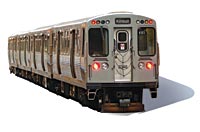| Taxicabs | ||
| Chicago | ||
| $2.25 | for the first 1/9 mile; 20 cents per each additional 1/9 mile. Add 20 cents for every 36 seconds the cab is idle.
Extras: The first additional passenger is $1. Extra persons are 50 cents each. |
|
| New York | ||
| $2.50 | upon entry; 40 cents for each 1/5 mile. Add 40 cents per each additional two minutes that the cab is traveling under 6 mph. A surcharge of 50 cents applies from 8 p.m. to 6 a.m., and a weekday surcharge of $1 between 4 and 8 p.m. Extras: No charge for additional passengers Airport bound: Metered fare to JFK or LaGuardia from Manhattan (typically $41 to JFK, $25 to LaGuardia); from JFK to Manhattan, $45 flat fee On the street: 12,779 licensed taxicabs-and if it’s not yellow, it’s not licensed. |
|
| Los Angeles | ||
| $2.20 | for the first 30 seconds or first 1/11 mile; 20 cents for each additional 1/11 mile, and 20 cents more for every 30 seconds that the taxicab is idle Extras: No charge for additional passengers Airport bound: From downtown to LAX, a $38 flat rate applies; add a $2.50 surcharge for trips from LAX to downtown. On the street: 2,300 licensed taxicabs |
|
| Boston | ||
| $1.75 | for the first 1/8 mile; 30 cents per additional 1/8 mile Extras: No charge for additional passengers Airport bound: $2.25 fee for fares to Logan Airport, $4.50 for harbor tolls leaving the airport; the typical fare to Logan from downtown is $23 to $25. On the street: 1,825 licensed taxicabs |
|
| Subways | ||
| Chicago “El” | ||
| $2.00 | or $1.75 with Chicago Card or Chicago Card Plus
How many: 500,000 trips on an average weekday |
|
| New York City Subway | ||
| $2.00 | How many: 4.5 million trips per average weekday How late: 24-hour service Fast fact: New York’s subway has the largest subway car fleet in the world. |
|
| San Francisco “BART” | ||
| $1.40–$7.65 | Fares vary by distance. How many: 310,717 trips on an average weekday How late: Closes at midnight; opens at 4 a.m. weekdays, 6 a.m. on Saturdays; 8 a.m. on Sundays Fast fact: When BART construction began on lower Market Street in the late 1960s, workers found buried ships where the land was once a harbor. |
|
| Washington, D.C. Metro | ||
| $1.35–$3.90 | Fares vary by distance traveled and time of day. How many: Typical weekday ridership, 688,146 How late: Opens at 5 a.m. on weekdays, 7 a.m. weekends; runs till midnight Sunday through Thursday and till 3 a.m. Friday and Saturday Fast fact: Metro boasts the longest escalator in the Western Hemisphere, with a 230-foot ride-the equivalent of about 25 stories-from street to platform at its Wheaton, Maryland, station. |
|
| Atlanta “Marta” | ||
| $1.75 | How many: 461,000 trips per average weekday How late: 5 a.m. to 1 a.m. Monday through Friday, to 12:30 a.m. weekends Fast fact: MARTA is one of the country’s newest rapid transit systems: its first rail line opened in 1979. |
|
| Boston “T” | ||
| $1.25 for most rides |
How many: About 639,400 weekday trips How late: Most trains run from 5 a.m. to 12:50 a.m. Fast fact: The T’s Green Line, which runs beneath Boston Common, opened for service in 1897-making it the nation’s first subway line. |
|
|
Photography: top Vinicius Vecoso, bottom Keith Levit Photography/images.com
|
||




